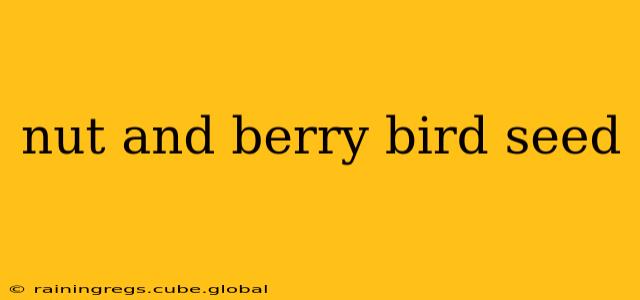Attracting birds to your garden is a rewarding experience, offering a delightful symphony of chirps and a captivating display of vibrant plumage. One of the most effective ways to achieve this is by providing a high-quality food source, and nut and berry bird seed blends are a fantastic choice. This comprehensive guide delves into the benefits, composition, and best practices for using nut and berry bird seed to create a thriving avian habitat.
What Makes Nut and Berry Bird Seed So Appealing to Birds?
Birds have diverse dietary needs, and a blend that incorporates nuts and berries caters to a wider range of species. Nuts provide a rich source of protein and healthy fats, essential for energy and overall health, particularly beneficial during colder months. Berries, on the other hand, offer vital vitamins, minerals, and antioxidants, supplementing the nutritional profile and adding variety to the bird's diet. This combination makes nut and berry blends significantly more attractive than simpler seed mixes.
What Types of Nuts and Berries Are Typically Included?
The specific nuts and berries included can vary between brands, but common choices include:
- Nuts: Sunflower seeds (a popular favorite amongst many birds, often considered a "nut" in this context), peanuts (in-shell or shelled), walnuts, pecans, almonds, and hazelnuts.
- Berries: Dried cranberries, raisins, and other dried berries are frequently added to provide extra appeal and nutritional diversity. While fresh berries are a delightful treat for birds, they are typically avoided in commercial blends due to their short shelf life and increased risk of spoilage.
The best mixes will clearly list all ingredients on the packaging, allowing you to make an informed decision based on the species you wish to attract and their dietary preferences.
What Birds Are Attracted to Nut and Berry Bird Seed?
Nut and berry blends are particularly effective at attracting a wide variety of birds, including:
- Larger birds: Jays, woodpeckers, and cardinals are often drawn to the larger nuts and seeds.
- Smaller birds: Finches, chickadees, and titmice will happily consume the smaller seeds and berries.
- Ground feeders: Doves and juncos will benefit from seed that falls to the ground.
Is Nut and Berry Bird Seed Good for All Birds?
While nut and berry blends provide a balanced diet for many species, it's crucial to remember that not all birds are created equal. Some birds, due to their beak shape or natural diet, may not be suited to these blends. For example, hummingbirds primarily feed on nectar and insects, rendering this seed mix inappropriate for them. Always research the specific dietary requirements of the birds you want to attract to ensure you provide suitable food sources.
How to Choose the Right Nut and Berry Bird Seed?
Choosing the right birdseed requires careful consideration. Look for blends that:
- List ingredients clearly: This will help you understand what you're feeding the birds.
- Avoid fillers: Some cheaper mixes contain a high proportion of less desirable fillers like milo or wheat, which offer minimal nutritional value.
- Are fresh and free from mold or pests: Check the packaging for any signs of spoilage.
- Come from reputable brands: Established companies typically uphold higher standards of quality control.
What Are the Benefits of Using Nut and Berry Bird Seed?
Beyond attracting a variety of birds, nut and berry bird seed offers several additional benefits:
- Nutritional value: The blend provides a well-rounded diet for many bird species.
- Increased biodiversity: It encourages a wider range of birds to visit your garden.
- Year-round feeding: Nuts and dried berries offer a good source of sustenance, even during winter when natural food sources are scarce.
How Often Should I Refill My Bird Feeder?
The frequency of refilling depends on the size of your feeder, the number of birds visiting, and the weather conditions. During colder months, birds require more food to maintain their body temperature, so you'll likely need to refill more frequently. Regularly check your feeder and replenish the seed as needed to ensure a consistent food supply.
By providing high-quality nut and berry bird seed, you can contribute to a thriving avian ecosystem in your backyard, enjoying the beauty and sounds of nature year-round. Remember to always research the specific needs of local bird species to tailor your feeding strategy for the best results.
